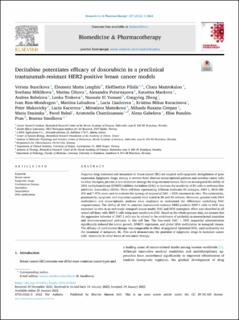Decitabine potentiates efficacy of doxorubicin in a preclinical trastuzumab-resistant HER2-positive breast cancer models
Buociková, Verona; Longhin, Eleonora Marta; Pilalis, Eleftherios; Mastrokalou, Chara; Miklíková, Svetlana; Cihova, Marina; Poturnayova, Alexandra; Mackova, Katarina; Bábelová, Andrea; Trnkova, Lenka; El Yamani, Naouale; Zheng, Congying; Rios-Mondragon, Ivan; Labudova, Martina; Csaderova, Lucia; Kuracinova, Kristina Mikus; Makovicky, Peter; Kučerová, Lucia; Matuskova, Miroslava; Cimpan, Mihaela-Roxana; Dusinska, Maria; Babal, Pavel; Chatziioannou, Aristotelis; Gábelová, Alena; Rundén-Pran, Elise; Smolkova, Bozena
Peer reviewed, Journal article
Published version
Permanent lenke
https://hdl.handle.net/11250/2977894Utgivelsesdato
2022Metadata
Vis full innførselSamlinger
- Publikasjoner fra Cristin - NILU [1360]
- Vitenskapelige publikasjoner [1096]
Sammendrag
Acquired drug resistance and metastasis in breast cancer (BC) are coupled with epigenetic deregulation of gene expression. Epigenetic drugs, aiming to reverse these aberrant transcriptional patterns and sensitize cancer cells to other therapies, provide a new treatment strategy for drug-resistant tumors. Here we investigated the ability of DNA methyltransferase (DNMT) inhibitor decitabine (DAC) to increase the sensitivity of BC cells to anthracycline antibiotic doxorubicin (DOX). Three cell lines representing different molecular BC subtypes, JIMT-1, MDA-MB-231 and T-47D, were used to evaluate the synergy of sequential DAC + DOX treatment in vitro. The cytotoxicity, genotoxicity, apoptosis, and migration capacity were tested in 2D and 3D cultures. Moreover, genome-wide DNA methylation and transcriptomic analyses were employed to understand the differences underlying DAC responsiveness. The ability of DAC to sensitize trastuzumab-resistant HER2-positive JIMT-1 cells to DOX was examined in vivo in an orthotopic xenograft mouse model. DAC and DOX synergistic effect was identified in all tested cell lines, with JIMT-1 cells being most sensitive to DAC. Based on the whole-genome data, we assume that the aggressive behavior of JIMT-1 cells can be related to the enrichment of epithelial-to-mesenchymal transition and stemness-associated pathways in this cell line. The four-week DAC + DOX sequential administration significantly reduced the tumor growth, DNMT1 expression, and global DNA methylation in xenograft tissues. The efficacy of combination therapy was comparable to effect of pegylated liposomal DOX, used exclusively for the treatment of metastatic BC. This work demonstrates the potential of epigenetic drugs to modulate cancer cells' sensitivity to other forms of anticancer therapy.

